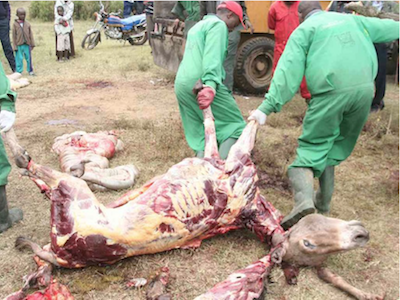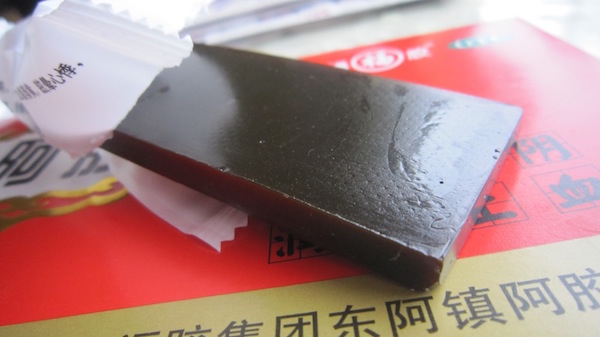A tremendous boom in donkey skin exports towards China from northern to southern Africa has been noticed over the last year. The countries hit the most are Egypt, Burkina Faso, Mali, Niger, Kenya, Tanzania, Botswana and South Africa. In Egypt, one donkey was sold 17 € two years ago and 170 € today.
Burkina Faso is the symbol of this sudden persecution.
– 1st quarter 2015: 1000 skins exported.
– 4th quarter 2015: 18.000 skins.
– 1st half of the year 2016: 65.000 skins.
On August 3, the Burkinabe government enforced a decree banning exports of live donkeys and donkey parts. Mali and Niger took similar dispositions. With such an exponential rhythm in slaughter, domestic donkeys in Burkina Faso (between 1 million and 1.3 million individuals) could be wiped out within 5 years. The meat is partly burned near the undercover slaughterhouses. Neighbors of the Sahel Slaughterhouse, a registered establishment run by a Frenchman and Chinese associates, are seeing trucks filled with donkeys coming in from Mali, Niger, Nigeria and Mauritius. In reenacting for donkey skins what had happened with pangolin scales, China is extending its gathering grounds by relying on the diaspora and expatriates present and influent on the African continent.
 © George Murage
© George Murage
Loss of donkeys in Africa is a cultural, agricultural and social disaster. The Minister of animal resources in Burkina Faso regrets that a project to distribute 10,000 ploughs is on standby because the donkeys are disappearing. Donkeys are multitask accomplices in rural households. They help carry the water, wood, clay and are an on hand means of transportation for the children.
Some families do not resist the temptation of some quick cash and sell their donkey for 150 to 200 € to slaughterhouses or their middlemen. The average income for a farmer in the Sahel is 30 €. Beware if one wants to keep the donkey! Now they must be protected from theft and, to lower the risk, tie them up at night in a fenced in place near the family home.
Once again it is inclination and appetite of the Chinese population for puppet remedies, sexual stimulants and youth elixirs all from animal origin that is the cause of such cruelty and social revolution.
Each year, 4 million donkey skins are transformed into gelatin that becomes an ingredient for cosmetics or consumables under the generic name Ejiao. The so-called best brands sell 12,000 € per kilo. The industrial center of the donkey trade is based in Shandong, an Eastern province in China.
 Ejiao bar © Deadkid dk /CC BY-SA 3.0
Ejiao bar © Deadkid dk /CC BY-SA 3.0
In 2010, a television advertisement made sales skyrocket. In 2015, Qin Yufeng, CEO of Dong’e Ejiao was complaining before the Popular congress about the “donkey shortage” that hit the hundred specialized factories. Domestic donkeys are on the verge to be extinct in China and breedings beyond to be shameful are not sufficient to answer demand. Donkeys are all butchered at 3 years-old. Chinese scientists are working on a possible high rate growth species.
Ejiao or donkey gelatin or donkey glue is used since ancient times as French catholic missionaries certified as soon as 1704 : “This drug is in vogue, so it is not adequate for the whole Empire and a lot of fakes are made out of horse hide, mule hide, camel hide, and sometimes out of boots.” Following the Emperors, communists elite have kept up the knack.
Given the matter of urgency and the power of Ejiao industry, it would be to no purpose to rely on educational words to the consumers.
Solutions :
– While waiting for one united African political line on donkeys, each country can found on his animal protection law to convict the donkey dealers. Four of them have just been condemned to eight month jail in South Africa for cruelty to animals. The 4 were charged under the Animal Protection Act No 71 of 1962.
– The Organization of African Unity regroups about fifty countries. Its executive council has the power to coordinate doctrines and policies in areas such as agriculture, breeding, animal resources and environmental protection. Robin des Bois advises the OAU to take on quickly the issue of pillaging of the donkeys livestock by Chinese industrials and adopt strict common measures to ban export in domestic donkeys and reinforce dispositions in favor of the protection of wild donkeys.
– The African wild donkey (Equus africanus) of whom a few hundred individuals survive in Eritrea, Somalia, Sudan and Ethiopia is listed since 1983 in Appendix I on CITES Convention (1). International trade in live specimens or their parts is banned. An annotation to this listing specifies that domestic African donkeys (Equus asinus) are not covered by the ban. It is needed that this annotation be removed rapidly and that domestic African donkeys be explicitly protected from international trade.
(1) CITES : Convention on International Trade in Endangered Species of Wild Fauna and Flora.
See also :
– Donkey too ! ! in the information and analysis bulletin on animal poaching and smuggling « On the Trail », n°12, p. 97 (pdf)
– « On the Trail », n°13, p. 98 (pdf)
– Donkey Pelt Account, « On the Trail », n°14, p. 99 (pdf)
 Imprimer cet article
Imprimer cet article








